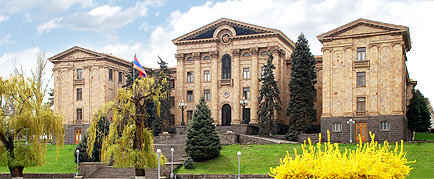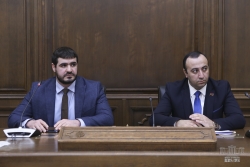At January 30 extraordinary sitting, the RA NA Standing Committee on European Integration moderated by Arman Yeghoyan touched upon the role of the NGOs and the Civil Society in the process of Armenia-EU Comprehensive and Advanced Partnership Agreement Road Map enforcement process.
Representatives of a number of NGOs functioning in Armenia took part in the sitting. The item of creating Civil Society Platform, which is designed by Article 366 of the Agreement, has been discussed.
According to the Agreement, the goal of the Civil Society Platform is to boost the regular meetings of the representatives of the civil society for keeping them informed on the enforcement of the Agreement and ensuring their relevant contribution.
It is envisaged that the Civil Society Platform will be a means of exchange of meetings and opinions and will be comprised of three representatives from the Civil Society of the European Union, three members from the European Economic and Social Affairs Committee and representatives of the Civil Society organisations, networks of the Republic of Armenia, including the National Platforms of the Eastern Partnership (four persons). That is, generally, the Platform will be comprised of 10 representatives. The members of the Platform will be regularly changed in rotation order, and which members will be included in the NGOs will be clear a few months later. It is expected to work out standards during the two-month period, according to which, the NGOs can be tended to be included in the Platform, afterwards a competition will be announced, and a as result, the structure will be formed. The item that the NGOs can take part in the competition as registered or also freely functioning will be still discussed.
The Committee members and the NGO representatives highlighted the enforcement of the provisions of Armenia-EU Comprehensive and Advanced Partnership Agreement and noted the priorities and spheres where there is a need for reforms and monitoring.
The participants of the discussion have considered first and foremost the implementation of the reforms concerning the issues judiciary system reform, the anti-corruption strategy, the education
sphere, the human rights, speech of hatred, the gas, electricity and water tariffs, the amendment of the Labor Code, the transport security provision, for which they are ready to present their expertise advice and the proposals formed as a result of monitoring.
The Committee will organise meetings with relevant NGOs in the near future to discuss these and many other items according to the spheres.
At the sitting the participants also referred to other items.




 30.01.2020
30.01.2020 30.01.2020
30.01.2020 30.01.2020
30.01.2020 30.01.2020
30.01.2020
